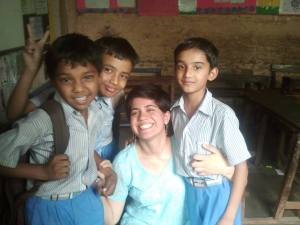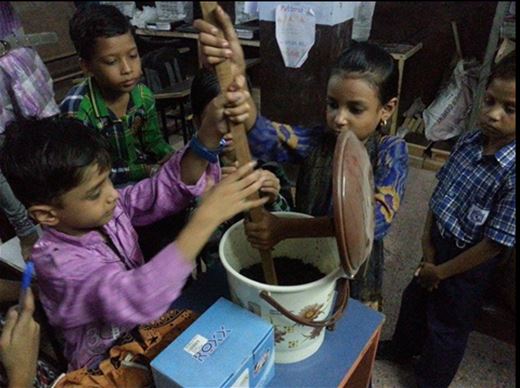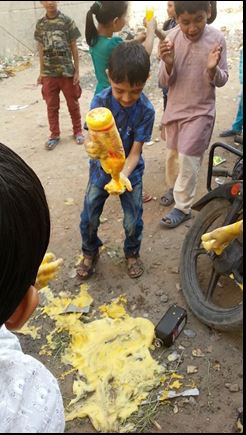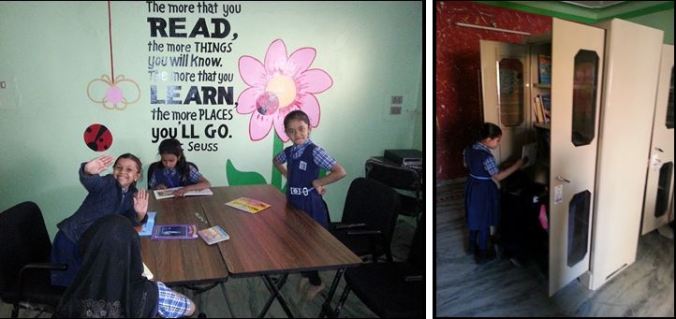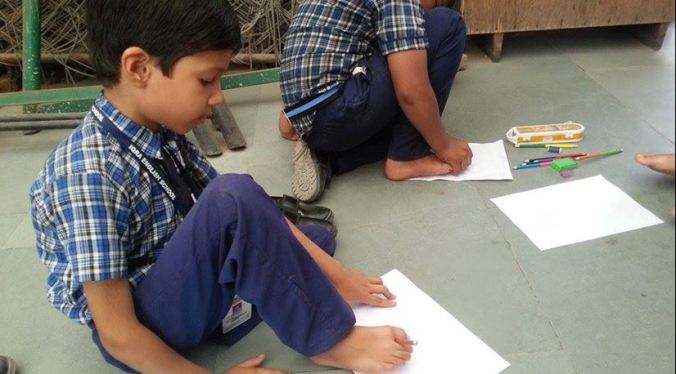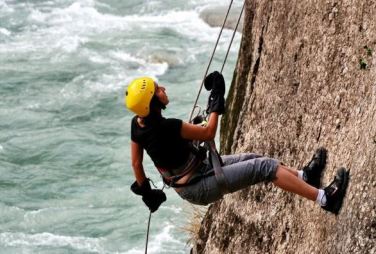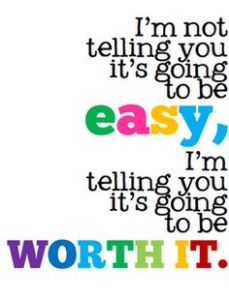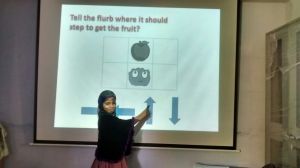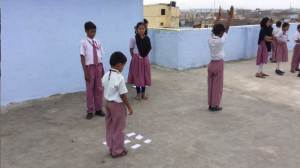This week, we have Ghazal sharing all the awesome work she’s doing after Fellowship!
Super Fellow Yashwanth shares his experience – Must read!
Imagine going to work each day knowing that you’re up against a wall, being able to influence the lives of over four hundred people, and having people think you’re deaf because you shake your head when you can’t understand what they’re saying. Well that’s what my life has been like for the past one and a half years as a fellow in Ahmedabad.
A rollercoaster of highs and lows, Teach for India has literally been one of the hardest things that I’ve ever done. It sounds cliché I know but it is true. Working in this company is not easy.
But it does come with its fair share of rewards. Seeing the joy on my children’s faces whenever we did science experiments and science related activities was one of them. One of the most memorable was the compost pile we made last year using fruits and vegetables the children brought from their homes.
In the photo above, my students Rushan and Alina are mixing the compost we were making. We had to do mix everything for a few days until all the vegetables and fruits had turned to compost. After we made the compost, we poured it over a dying tree in our school and small plants began to grow from the compost. The children thought they were baby trees.
Here the children are doing the elephant’s toothpaste experiment. It’s not real toothpaste but a mix of soap and bread yeast. That was a lot of fun to do. People from the community came to see what we were doing. They loved it too.
Converting an unused classroom into a library was something that I’ll never forget. It seems really small because everyone makes libraries in TFI but for some reason it really made me believe in the sense of the possible.
I also enjoyed doing different art activities with the children.
We did this earlier on in the week. I had my students draw using only their feet. Though they struggled with it as they had never drawn with their feet before the kids had a blast. Especially because it pushed them out of their comfort zone.
I have struggled with a few things however. The pay is one of them. I know the company only pays us what it can but…I just wish it could give us a bit more. Teaching low income kids with a 22,000 rupee salary and bills to pay is not easy. Every month I have to resort to spending 2,000 to 3,000 rupees out of my own salary on my class. My quality of life has deteriorated quite heavily due to this. Things have gotten so bad that I only have around four pairs of clothes to my name. Whenever one of those clothes tear, I fix them by using fabric glue. I can’t afford to buy new ones.
And things are only going to get worse. My printer is nearly broken and I may have to buy a new, I have to buy a new hotplate, a few pipes in my home are damaged, I have an expensive electricity bill to pay, and I have to start getting hundreds of worksheets for my kids in order to get them to a 4.0 – 5.0 RC level by January.
I feel that’s why I’m sometimes unhappy out here. I’m so stressed out with paying my bills and getting supplies for my kids. I sometimes cry in bed thinking about what to do about my finances. I don’t want to stop getting supplies for my kids because I love them so much but I just don’t have the money. I feel like such an awful human being for not being able to take care of my kids’ needs.
Fundraising is not easy, nor is it an option for me at this point. Nearly all my donors have stopped donating to my class. They feel they’ve given enough. Which they have. I don’t blame them for not giving.
The only person who still offers to donate money to me is my father. He has been one of my biggest donors and is always offering me money but I feel so guilty inside for taking money from him. He has over $500,000 (33 lakh rupees) worth of debt to pay off and I feel like I’m hurting him whenever I take money from him. I love him a lot and want him to enjoy his life, instead of having to deal with my problems.
The library which I’m so proud was actually paid because of a loan my father took from the bank. He kept this a secret from me for the longest time as he didn’t want to me to feel bad about it.
There are other problems I’ve faced in TFI but I feel that I’ve brought them on myself. I’m struggling quite a bit with my arrogance and brutal honest (I can quite disrespectful). I know that I need a lot of work.
But overall my experience with TFI has been quite good. My father especially loves the changes he’s seen in me. I’ve become more practical as a person and am able to deal with difficult situations. So yes, my experience with TFI has been quite good indeed.
——-
You may write to Yashwanth at yashwanth.d2014@teachforindia.org
Super Alum Interview – Master Teacher Navya!
1. WHAT are you doing currently and WHY did you chose to do it after the Fellowship?
I am working as a Researcher and High School Math Master Teacher at Meghshala. After the fellowship, I realized that the biggest thing which can help in providing a quality education is having quality teachers. There are great teachers and teachers who can become great in our country, but they cannot reach their full potential because of limited resources and empowerment. I joined Meghshala so that I can help in empowering teachers from across the country by using technology, and in the process deliver the world class education that students deserve.
2. How is Fellowship experience helping you in your current role?
The fellowship experience has helped me in my role now because I understand the problems faced by normal teachers in low-income schools. When I am creating content, I always look back to my classroom- like teaching values in everyday lessons and connecting it to the real world. Analyzing data and drawing insights from them(trackers!) also has helped me in my role as a Researcher.
3. If given a chance to do the Fellowship again, what would you do differently?
If I was given a chance to do the Fellowship again, I would engage more with the community. I was so focused on my classroom and school, that I somehow never worked hard enough to extend the sphere of influence to the community, which is a major influence on our kids.
———-
You may contact her at navya.akkinepally2012@teachforindia.org
Super Alum Interview – Zuha Moin!
3. If given a chance to do the Fellowship again, what would you do differently?
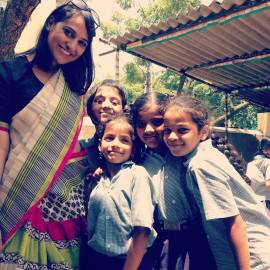
When she is not busy ensuring every child has an excellent education, Zuha can be found practicing yoga, learning how to cook Hyderabadi food, or planning her next international escapade. Zuha is from New York and currently resides in Washington, DC.You may contact her at: zuha.moin2012@teachforindia.org
Super Relationship builder – Tanay Sukumar!
———————
Findings are based on conclusions made out of survey reports, discussions with Fellows and staff, and discussions within the team working in this project.
Part 1: Core Beliefs that will help you on the way
a) We needn’t be an activist or protester at school. Be a leader. Protesters demand instantly; leaders invest over time. Protesters seek short-term change, because they work with the situation; leaders seek to change things for the longer run, because they work with mindsets.
b) As a teacher, our work as a Fellow is incomplete without building sustainably invested school and class teacher relationships. If we don’t have this belief, we will tend to settle down with basic working relationships, and will tend not to think about investing them in why we do what we do and sustainability beyond my own Fellowship.
d) If it seems impossible, it’s not because there’s no solution, but because the right solution/way/approach has not been tried yet. As Fellows, our task is not to complain, give up and blame others, it’s to FIND WAYS. At the same time, be gentle on yourself.
Part 2: The Rubric
We created a rubric to explain different aspects of class teacher relationships. Caution: If your relationship is at Level 1 (cooperative but not invested), it is only a basic working relationship, and NOT ideal for our work in long term. You need to constantly push for a level higher. Look at the Class Teacher Relationships Rubric. Please work with your school teams to brainstorm how to reach the next level and how to build your leadership skills in the process.
The rubric was created by our team: Kumar Manish, 2013 Fellow; Prayas Sutar, Cherry Agarwal, Heena Narula, Pallavi Singhal, Ritika Rastogi, 2014 Fellows.
Questions you need to ask (Thinking about these questions will help you guard against common mindset issues of your own)
- Why should the school staff think the way I do?
- Why should they agree to me?
- If they think similarly to me but still do things differently, why is that?
- What are their struggles? What is their life like?
- Am I starting conversations from my perspective, or their perspective? (Start conversations from the others’ point of view, not yours)
- If it’s something they have done/believed in for years and decades, why should they immediately accept my view?
- Do I think of myself as a teacher with mindsets, skills and training different (or maybe similar) to them, or do I think of myself as a teacher with mindsets, skill and training SUPERIOR to them? (if it’s the latter, you need to change this mindset right away. Don’t be reluctant to admit that; a lot of Fellows tend to think that way, and that is the root of most problems.)
- Am I expecting changed mindsets immediately? Why?
- Am I expecting school staff to behave the way we behave with each other at TFI? Why?
- Do I have a basic relationship at a human level with the person, before I even think of solving issues?
How to approach problems
- Don’t panic. Don’t react. Stay calm.
- Think: Why did the problem occur?
- Think: What did the person say/do which bothered you/created a problem?
- Think: Why did they say/do? What is their underlying mindset? Why do they think so?
- Think: a short-term solution (since a mindset change is a long journey; to ensure that the problem at hand doesn’t affect your students for now, think of a short-term solution which takes both your and the school staff’s point of view and mindset in consideration, and not just yours)
- Think: Based on how deep or strong that underlying mindset, think of a desired end result for your first conversation. Your issue might often get solved in the first conversation (followed by repeated reinforcement), or it may take multiple conversations throughout the two years. What is the goal of your first conversation? (E.g. if it’s a problem that will take a long time, your first conversation might just be an effort to understand the mindset deeper. What’s the hurry to jump to your perspective, unless you understand the other person’s perspective?)
- Plan: Plan the conversation in your head/on paper.
Suggested flow of conversations:
- Cite problematic incident and seek their perspective
- Find instances that are evidence for that person’s perspective
- Say your perspective
- Apply your perspective on examples that the person gave you in step 2
- Ask what they think about the way you thought about it
- Try to find something about their perspective which you appreciate/agree with/find reasonable to some extent. If you can’t, just accept the possibility of their mindset being desirable (if you’re unable to find it, you need to think about your own mindsets first: even if the teacher thinks caning kids is a way to discipline them, you can say, “I see that you really want to inculcate discipline in the kids, and I think that is a method our ancestors have used for a long time, so there might be some merit in it, but let’s think of it this way …”)
- Next, again come back to your perspective. Give fresh evidence and examples.
Don’t do it all in one conversation. Go back to the questions above.
Keywords: Listen, Seek Perspective, Seek Evidence, Give Evidence, Give them time, accept, Plan conversation, Don’t react impulsively, Don’t expect it to happen immediately
Use school issues to model for your kids these values: respect, patience, perseverance, and acceptance of others’ views.
Remember:
Building relationships is a human skill. Be human; approach issues with basic human values: respect, empathy, patience, etc. Use basic human tools which work everywhere: examples, evidence, and just talking.
Super Fellow Neha shares her journey!!
This is what almost every Fellow realizes through their 2-year journey!
Our Super Fellow Neha feels the same. Like any other Fellow, she had her own set of struggles and successes through the past 13+ months. Let’s read her story, in her own words:
——–
I have always loved challenges and am someone who is very passionate about the country. So when I got to know about Teach for India and read its tagline ‘ Are you ready for the challenge?’ I found it very exciting and decided to take it up.
Well, my journey in Teach For India has been very challenging, right from the first week of school. It started with explaining others our method of instruction and convincing them to adopt it, or balancing out the school and TFI curriculum, my classroom was not settled till October as a result of which all my classes were also not very productive, we were not allowed to visit the communities nor were allowed to call parents to discuss the performance of their students. Our school management was not very cooperative which made things a little difficult and every week had a new challenge for us.
The challenges kept on getting complicated and it became very difficult to carry on. I knew that the task was not going to be easy and quitting was not an option. I had taken up the responsibility of 38 naughty little kids, had high hopes for them and was just not ready to leave them midway. So after thinking about it for a while I tried thinking of ways that would reduce my stress levels. I am very passionate about cycling and hence I joined a cycling club. I started going for cycling every night where I got time to step back and reflect. It gave me peace of mind and helped me regain my energy.
Apart from that after seeing the MY results when I saw my kids growth I could see my hope for my kids turning into reality. My kids kept me motivating me to deliver my best to them and year one of fellowship was almost over.
Just before going for my summer break I had thought of changing schools because we were not allowed to visit the community and I really wanted to do something for the community from where my kids came. My trustee had told me that this year he is going to allow us to engage with the community bit I was not ready to trust him and thought that this time also its just game words. During my summer break I went for a mountaineering course a one month long course where I was away from the world, away from internet and mobile. Just with a group of 50 odd people from all across the country. At the end of the course I did not just learn mountaineering skills bit also learned how to trust people. I saw values playing out in action. The course gave me the much needed break. It motivated me to be ready to take up any new challenge that comes on my way. It gave me the courage to take up the challenge of trusting my trustee.
I still continue to work in the same school with the same set of kids, but this time I am more focused and all set to give in my 100 percent. I do know that the journey is going to be difficult very challenging yet exciting. And if I go down on energy I know I can always go out for a cycle ride, talk to my kid who make me realise the change that I am trying to make and motivate me to be back on the path, and when I am back on the path I make sure that I am back with a Bang!
——
Thank you for sharing your story Neha! I’m sure it will serve as a source of inspiration to all of us.
Super STM Minutes from Pune – Epiphany EMS
When I saw this email from Preethi, a close friend of mine and a wonderful PM, I was awed. Keep reading, and so will you be.
———————–
Dear Team,
PFB Epiphany’s weekly STM’s updates. This is such a strong example of Collective action. There is so much to learn from each other. I’m sure there are wonderful things happening in all school teams. Would love for all of us to get into the habit of sharing 🙂
Regards,
Preethi
———- Forwarded message ———-
From: Vinay R <vinay.r2014@teachforindia.org>
Date: Sat, Jul 25, 2015 at 8:45 AM
Subject: Step back to step forward#week 6#Epiphany#Warmth
To: Deepayan Biswas <deepayan.biswas2014@teachforindia.org>, Sreya Rakshit <sreya.rakshit2014@teachforindia.org>, Udita Rao <udita.rao2015@teachforindia.org>, Ajay Tambay <ajay.tambay2015@teachforindia.org>, Ridhi Agarwal <ridhi.agarwal2014@teachforindia.org>
Cc: Preethi Rajashekar <preethi.rajashekar@teachforindia.org>, Deepak Joshi <deepak.joshi@teachforindia.org>
- 21st July – Pop in and HM meet by Preethi
- 23rd July – STM – 3 to 5.15
- 24th July – Session on child safety (Grade 5,6 and 7) – 9 to 10
- 24th July – Guest speaker session in my class – “Design” 10.30 to 11.30
- 24th July – Project Netritva#phase one# “Yellow hat activity” (Deepayan), reflection 3 to 5.30
- 24th July – Ujwala Gaikwad ma’am’s reception
- 25th July – School staff meeting – sessions – 9.30 to 1.30
- 25th July – Amdocs# class room painting
- Parent literacy – Ridhi – Mon, wed and Fri
- Weekly plan to principal (20th July)
- Preparing question papers for unit test 1 (20th July)
- Peer class room observation
- Feed back on observation
- Attendance register -keep it updated
- Reflection journal
- Zilla Parishad – student data forms – Swaranjali ma’am
- 27th July – Holiday, on account of Ekadashi
- 28th to 31st July – Unit test, school ends by 11.30, teachers are expected to stay for a while.
- 29th – Biriyani party by some of the school teachers at 1
- KCT school visit and observation, I will be visiting Shalini didi for the planning and scheduling of visit, which will happen on Monday, post which we’ll have the dates for the same.
- STM – depends on KCT dates, can we be ready to have it on 28th ? Will this one be a lunch meeting outside?
- Plan(s) to principal – weekly for 15’ers and UP for 14’ers – 31st July 2015
- Unit test 1 paper corrections.
- Activities for the month of August to Raut ma’am (31st July)
- Peer class room observation (quid pro quo)
- Feed back on observation (quid pro quo)
- Reflection journal (read this very softly)
- Student data entry (ZP)
- Academic trackers in all classes –31st July 2015
- Completion of prior weeks work.
- Opening – Ajay
- Temperature check – how’s the journey so far?
- BOY results – we’ll all present the analysis of our respective classes : current status, summer slide and goals.
- Class room updates
- Article reading – Udita
- Continue “Who am I?” lets discuss each others Range report
- Quick updates:
- SA sessions of Netritva – Sreya
- Amdocs and Volkswagen visit – Deepayan
- Parent literacy and IUCAA visit – Ridhi
- Guest speaker series – Vinay
- Ragda sessions for 8B – Ajay
Super Collaborator from our Learning Circle – Sai Manoj
We all know the mission before is overwhelmingly large and urgent. It’s not an individual but a collective that will lead us closer to achieving Ed-equity! Sai Manoj, 2014 Fellow, who works in IQRA School, shares his journey of personal mastery and collective action.
—————–
One big reason why I joined the fellowship is to understand what could be the best curriculum/system that is needed for a child to grow and how best I can provide it as a teacher.
Even before the start of the fellowship, I read about “Alternate” and “Democratic” models of education. I am always curious to know, how a child who studied in these system will be different from the “traditional” Indian education system. I made a list of school whenever I heard a new name from different people I chatted with. Finally I visited one of the schools which come under the category of “Alternate” education system.
Visit to Sahyadri School:
“Education is not about running after the world things but to understand one self”. These lines made me travel to Pune to visit this school. Caring teachers, no exam pressure among students, no comparison among students, completely bonded school (A student in 12th grade has friends of 4th grade), choices for students, no competitive spirit among students and finally freedom to express oneself; these are some of the things that I have seen in this school. “No competitive spirit” is it good or bad for the kids. Honestly, I don’t know. My search still continuous for different systems…
To understand more about the school follow the below link
http://www.sahyadrischool.org/index.php
Collaborations(You may speak to Sai in more detail about these):
1) I started working with a 15er by sharing my experience and listening & supporting the 15er. This is helping me to look into the technical aspects of teaching.
2) As part of our BTCP, I am visiting Irfan’s classroom. Apart from regular observations on the kids, the best part was to observe the teacher. Once a lesson plan is executed in front of us, it becomes so easy to execute the same in our class. In the last week, I executed “how to introduce a value” and “Image theatre” which are ideas from Irfan and Revanth’s classroom.
3) Another thing we as a school team has started off is, coaching our HM. We are trying to give more professional training to him. A couple of days back, I remember him mentioning how effective it was to have an “Agenda” for the day over not to have an agenda.
—————————————————
You may contact him to know more: sai.manoj2014@teachforindia.org
(The reason why this article is being shared is because I was very curious to know what is that motivates Sai to collaborate, learn and experiment every single day to become a better teacher and a leader. When I got to know his WHY, I thought this is a story worth spreading! )
Super Fellow from our Learning Circle – Featuring Irfan Lalani
Last year in November, I got to know about the event Hour of Code of code.org from a mail shared from organization effectiveness staff member. The purpose of the event was to engage kids in fun way to give them exposure to world of computer science and coding. The experience was amazing as the kids engaged throughout the hour long event understanding the ASCII codes. I realized the importance of teaching computer science/codes to kids considering the digital future they will be living in where the understanding of how computer works will give added advantage rather than merely using applications.
My desire to teach coding increased on seeing the below quote of Steve Jobs,
“Everyone in world should know how to code, because it teaches you how to think.”
See these videos for more inspiration.
Click Me
Click Me
I came across the fact that U.K and Finland have already started integrating programming in their academic curriculum for kids as young the primary ones. I also realized that coding is just not about computer skills but it teaches kids skills like logical thinking, critical thinking, problem solving, collaboration and communication which are very necessary in the daily world we live in.
This year I am following the course level 1 curriculum by code.org which has some unplugged (without computers with full fun) and plugged ( with computer) activities. I have done two activities till now which focused on Algorithm i.e. steps to reach goal and on Program i.e. coding the steps to communicate to machine to reach goal.
I have realized that the activities are not only fun and engaging but gives them exposure to computer science, builds team work, caters to critical thinking and problem solving, and even enhances literacy and math.
Meet me to see more videos of class. Thanks!
Irfan Lalani
Primary Teacher, Brighton English School
2014 Ahmedabad Fellow, Teach For India.
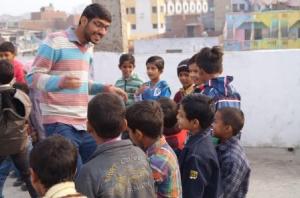
Super Alum of the week – Lisha Almeida speaks!!
“On 23rd July, 2015 at 5:30 pm, Ashrita, a grade 5 student Vivek Vardhini School in Huzurabad in Karimnagar district of Telangana passed away after being passed to 3 different hospitals. She had been made to stand for hours with her knees bent in school, which resulted in a blood clot.”
When I read this headline, I was filled with rage, frustration and a feeling of helplessness. I was enraged because while that teacher couldn’t have foreseen this unfortunate incident taking place, it could have been so easily avoided. I was frustrated because not enough people realize how important quality teacher education is in this whole fight for ed equity. I didn’t, however, continue to feel helpless. As I thought about it , I realized I knew exactly where I stand in this fight for educational equity and what my puzzle piece.
My name is Lisha, and I work with Firki, TFI’s teacher training portal. The vision for Firki is to create a world-class, blended learning program aimed at upping the quality of teacher training currently available. Firki is for everyone- Fellows, alumni, government school and private school teachers. This year, we are working towards creating a B.Ed-aligned course in consultation with The Riverside School. The time for change of this sort is right, with the government talking of alternatives to the B.Ed that focus on high rigour and quality.
My work requires collaborating with Riverside, the T&I team at Teach for India and various external experts in the field of pedagogy. While contextualizing this sort of training for low-income school teachers is challenging, it’s also something that excites me every single day. I know that we can really impact and radically transform teacher training and the quality of education our kids receive, so we never ever have to read about another Ashrita.

Lisha is an avid reader, amateur baker and animal rights enthusiast. In her free time, she binge watches Masterchef Australia and dreams of the animal sanctuary she will open one day. You can talk to her about food, social media and dogs.
You may contact her at lisha.almeida@teachforindia.org
